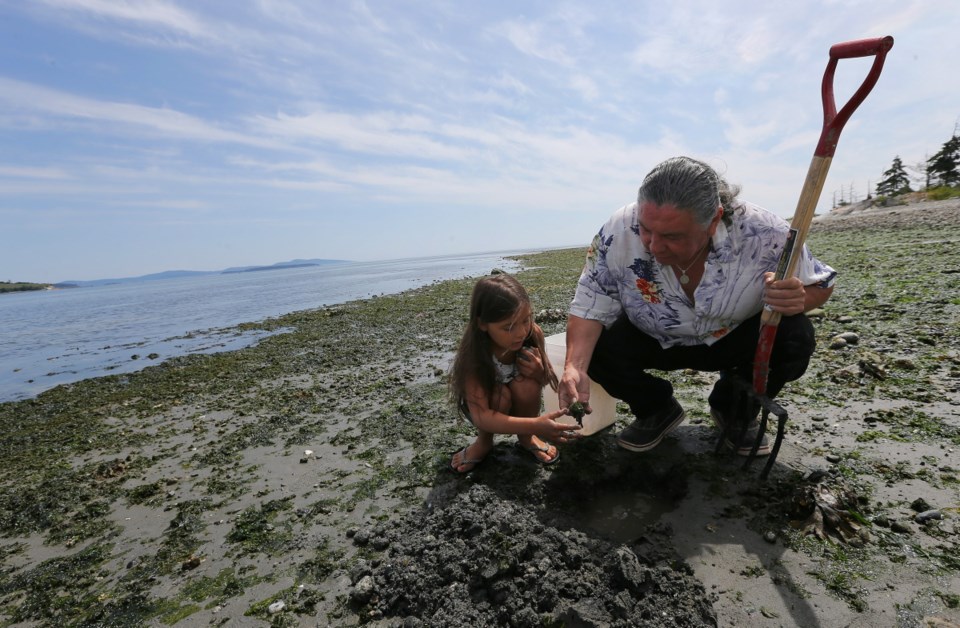Tsawout elder Earl Claxton Jr., 63, remembers how the squirt of seawater felt on his calves as he walked past clusters of butter clams at low tide as a kid.
Decades later, sewage outfall has contaminated the shellfish, a former dietary staple of the coastal nation.
But organizers of a local seafood festival hope to revive knowledge of the harvest, even if it means buying the clams elsewhere or bartering with First Nation partners in Alert Bay.
“It’s pretty important to me,” said fisheries manager Dan Claxton, Earl’s cousin, who started the festival seven years ago.
“It was something instilled in me as a boy, something I learned as I was growing up. Now, there’s a big disconnect.”
The Tsawout Seafood Festival, next Saturday at Tixen (Cordova Spit) from 11 a.m. to 4 p.m., is open to the public by donation. There will be demonstrations of harvests, traditional pit cooking, a salmon ceremony, arts and crafts, a traditional plant tour, drumming and singing.
Sourcing food for the feast is expensive — it costs about $20,000 to buy the food and compensate local fishermen. Costs have risen with the popularity of the festival, prompting a two-year hiatus in 2012 and 2013.
This year, there’s a suggested donation of $20 per seafood plate, but it’s important to Dan Claxton that the festival remains accessible to those who can’t afford the price.
“A lot of our First Nation people don’t have the capacity to pay for something like that because seafood isn’t cheap these days. So I didn’t want to discourage them from coming,” he said.
Dan Claxton learned about the harvest from his grandmother, who was a medicine woman, and has passed the knowledge on to his twin sons, who are 10. But he sought a wider audience.
Several years ago, a group of children approached him as he was delivering halibut, cod, red snapper and other species to elders.
“They were asking me, with these awful expressions on their faces, ‘Oh geez, what is that?’ ” he said.
He calls it the “McDonald’s generation” — one vulnerable to health problems due to diets high in salt and sugar.
“What I noticed was a big disconnect from our people and [a lack of] access to the traditional foods we are accustomed to. The younger generations were losing that.”
For Earl Claxton, that disconnect dates back to 1972, when the Capital Regional District installed a sewage treatment plant on Tsawout land.
“I’ve got a lot of resentment about that. The mayor of Central Saanich said to our chief, ‘If you put a glass at the end of the pipe, you’ll be able to drink it.’ And our chief said, ‘Well, you take the first glass and I’ll take the second,’ ” he said.
The band purchased the plant in 2000, plant operator Iggy Pelkey said, and has been working to reduce its environmental impact through upgrades.
Earl Claxton would like to see the federal government test the health of the clams, whose clean, white flesh has darkened.
Environmental technologist Shauna Johnson said cleaning up the bay is just one of many issues in competition for limited resources.
“It’s a long road because we’ve dealt with a lot of high-risk contamination sites on our land,” she said.
“It’s tough to figure out where you should go first. Having the capacity to even monitor our lands as much as we want to requires years of capacity-building, years of looking for funding and proposal work and educating our people on the issues.”
Meanwhile, Dan Claxton said the seafood festival is making a difference, sharing the importance of the harvest with locals as well as visitors to the community.
“To see some of those kids … who are now being reconnected with their traditional food and culture — it’s exciting for them and it’s exciting for me.”



